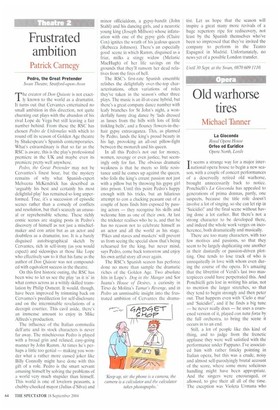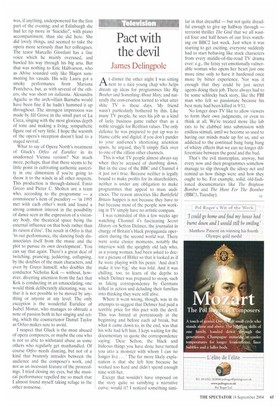Old warhorse tires
Michael Tanner
La Gioconda Royal Opera House Orfeo ed Euridice Opera North, Leeds I t seems a strange way for a major inter national opera house to begin a new season, with a couple of concert performances of a deservedly retired old warhorse, brought unnecessarily back to notice. Ponchielli's La Gioconda has appealed to generations of prima donnas, partly, one suspects, because the title role doesn't involve a lot of singing, so she can let rip in `Suicidie and the final scene without having done a lot earlier. But there's not a strong character to be developed there, and indeed the whole work verges on incoherence, both dramatically and musically.
There are too many characters, with too few motives and passions, so that they seem to be largely duplicating one another in their dastardly or passion-driven plotting. One tends to lose track of who is unrequitedly in love with whom even during the course of the opera. It's amazing that the librettist of Verdi's last two masterpieces could have perpetrated this. And Ponchielli gets lost in writing his arias, not to mention the larger stretches, so that they tend to begin strongly and then peter out. That happens even with `Cielo e mar' and `Suicidie, and if he finds a big tune — he never really does — he uses a coarsened version of it, played con tuna forza by the full orchestra. to bring the scene it occurs in to an end.
Still, a lot of people like this kind of thing, and to judge from the frenetic applause they were well satisfied with the performance under Pappano. I've associated him with rather finicky pointing in Italian opera, but this was a crude, noisy and almost self-parodyingly brutal account of the score, where some more solicitous handling might have been appropriate. And the singers were encouraged, or allowed, to give their all all of the time. The exception was Violeta Urmana who was, if anything, underpowered for the first part of the evening; and at Edinburgh she had let rip more in 'Suicidior, with piano accompaniment, than she did here. She did lovely things, and seemed to take the opera more seriously than her colleagues. The tenor Marcello Giordani has a fine voice which he mainly overused, and bawled his way through his big aria. But that was nothing to Eric Halfvarson, who as Alvise sounded only like Hagen summoning his vassals. His wife Laura got a smoky performance from Mariana Pentcheva, but, as with several of the others, she was short on italianita. Alexandru Agache as the arch-villain Barnaba would have been fine if he hadn't hammed it up throughout. The strongest impression was made by Jill Grove in the small part of La Cieca, singing with the most glorious depth of tone and making a living, sympathetic figure out of very little. I hope the warmth of the opera's reception doesn't lead to a staged revival.
What to say of Opera North's treatment of Gluck's Orfeo ed Euridice in its unadorned Vienna version? Not much more, perhaps, than that there seems to be little point in cultivating authentic austerity in one dimension if you're going to throw it to the winds in all other respects. This production is through-danced. Emio Greco and Pieter C. Sholten are a team who, according to the programme — a connoisseur's item of pseudery — 'in 1995 met with each other's work and found a strong common interest in the possibility of dance seen as the expression of a visionary body, the theatrical space being the external influence on that body rather than its raison d'être'. The result in Orfeo is that 'in our performance, the dancing body disassociates itself from the music and the plot to pursue its own development'. You can say that again. There's a great deal of twitching, prancing, juddering, collapsing, by the doubles of the main characters, and even by Greco himself, who doubles the conductor Nicholas Kok — without, however, diverting attention from the fact that Kok is conducting in an emasculating, one would think deliberately alienating, way. so that it is not possible to be moved by anything or anyone at any level. The only exception is the wonderful Euridice of Isabel Monar, who manages to obtrude a note of passion both in her singing and acting, which the countertenor Daniel Taylor as Orfeo makes sure to avoid.
I suspect that Gluck is the most abused of opera composers, or maybe the one who is not so able to withstand abuse as some others who regularly get manhandled. Of course Orfeo needs dancing, but not of a kind that brazenly intrudes between the audience and the composer's work, and not as an incessant feature of the proceedings. I tried closing my eyes, but the musical performance repelled me so much that I almost found myself taking refuge in the other nonsense.



















































































 Previous page
Previous page